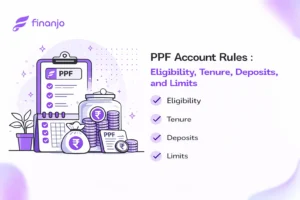The Public Provident Fund (PPF) is one of the safest long-term investment options in India. Since it is backed by the Government of India, it offers guaranteed returns along with tax benefits. That’s why both salaried and self-employed people prefer it. But before you open a PPF account, it’s important to know the rules about who can open it, how long it runs, how much you can deposit, and the limits.

| Rule Category | Key Details |
|---|---|
| Eligibility | Available for Indian residents (adults & minors) |
| Tenure | 15 years (extendable in 5-year blocks) |
| Deposits | Minimum ₹500 per year; Maximum ₹1.5 lakh per year |
| Limits | One account per person; deposits allowed in lump sum or instalments |
| Tax Benefit | Section 80C deduction up to ₹1.5 lakh + Tax-free interest |
Tip: If you’re planning long-term savings for your child’s education, opening a minor’s PPF account early can give a head start.
The default tenure of a PPF account is 15 years. This is counted from the end of the financial year in which the account is opened.
Example: If you open your account in August 2025, the 15-year period starts from March 31, 2026, and will mature on March 31, 2041.
After 15 years, account holders get two choices:
This flexibility makes PPF suitable for long-term goals like retirement, child’s education, or marriage.
The scheme is designed to be inclusive – whether you want to save small or large amounts.
Note: If you fail to deposit the minimum ₹500 in a year, the account will become inactive. To reactivate, you need to pay a penalty of ₹50 per year of default along with the minimum deposit.
Many parents prefer to open PPF accounts for their children. But keep in mind:
This rule often confuses investors, so it’s important to plan deposits carefully.
Even though PPF is a long-term investment, partial liquidity is allowed.
One unique benefit of PPF is the loan against your balance.
This makes PPF not only a savings option but also a low-cost borrowing option for emergencies.
PPF is one of the few investment instruments that enjoys EEE (Exempt-Exempt-Exempt) status:
This makes it a favorite for tax-saving investors looking for safe, guaranteed returns.
Just one.
Even if you open it in different banks or post offices, having multiple PPF accounts is not allowed.
You can deposit the amount:
PPF has a 15-year lock-in period.
That’s why it’s meant for long-term goals, not short-term needs.
Interest is calculated:
Yes, but only partially.
Yes.
Your account becomes inactive.
PPF enjoys EEE status:
After 15 years, you can:
NRIs cannot open a new PPF account
If a resident becomes an NRI, the existing account can continue till maturity (without extension)
Yes.
The Public Provident Fund (PPF) is one of the safest long-term investment options in India. Since it is backed by the Government of India, it offers guaranteed returns along with tax benefits. That’s why both salaried and self-employed people prefer it. But before you open a PPF account, it’s important to know the rules about who can open it, how long it runs, how much you can deposit, and the limits.

| Rule Category | Key Details |
|---|---|
| Eligibility | Available for Indian residents (adults & minors) |
| Tenure | 15 years (extendable in 5-year blocks) |
| Deposits | Minimum ₹500 per year; Maximum ₹1.5 lakh per year |
| Limits | One account per person; deposits allowed in lump sum or instalments |
| Tax Benefit | Section 80C deduction up to ₹1.5 lakh + Tax-free interest |
Tip: If you’re planning long-term savings for your child’s education, opening a minor’s PPF account early can give a head start.
The default tenure of a PPF account is 15 years. This is counted from the end of the financial year in which the account is opened.
Example: If you open your account in August 2025, the 15-year period starts from March 31, 2026, and will mature on March 31, 2041.
After 15 years, account holders get two choices:
This flexibility makes PPF suitable for long-term goals like retirement, child’s education, or marriage.
The scheme is designed to be inclusive – whether you want to save small or large amounts.
Note: If you fail to deposit the minimum ₹500 in a year, the account will become inactive. To reactivate, you need to pay a penalty of ₹50 per year of default along with the minimum deposit.
Many parents prefer to open PPF accounts for their children. But keep in mind:
This rule often confuses investors, so it’s important to plan deposits carefully.
Even though PPF is a long-term investment, partial liquidity is allowed.
One unique benefit of PPF is the loan against your balance.
This makes PPF not only a savings option but also a low-cost borrowing option for emergencies.
PPF is one of the few investment instruments that enjoys EEE (Exempt-Exempt-Exempt) status:
This makes it a favorite for tax-saving investors looking for safe, guaranteed returns.
Just one.
Even if you open it in different banks or post offices, having multiple PPF accounts is not allowed.
You can deposit the amount:
PPF has a 15-year lock-in period.
That’s why it’s meant for long-term goals, not short-term needs.
Interest is calculated:
Yes, but only partially.
Yes.
Your account becomes inactive.
PPF enjoys EEE status:
After 15 years, you can:
NRIs cannot open a new PPF account
If a resident becomes an NRI, the existing account can continue till maturity (without extension)
Yes.